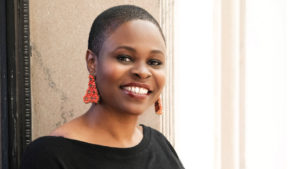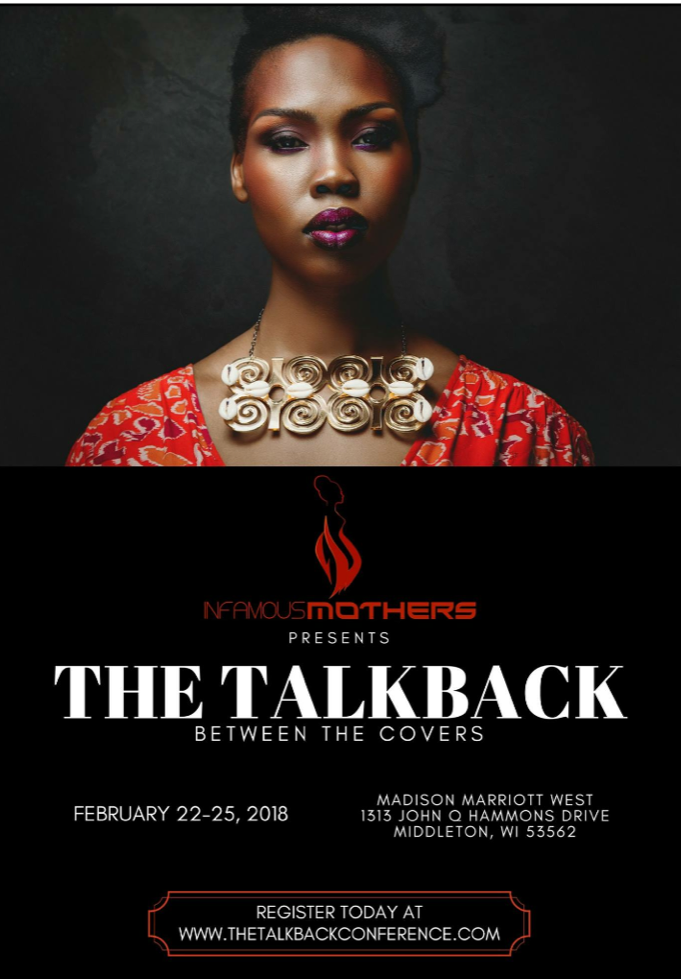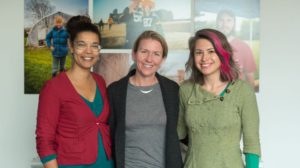Booker T. Washington, George Washington Carver, Frederick Douglass, W.E.B. Du Bois, Harriet Tubman.
Every year during Black History Month, millions of students and adults alike learn about the respectable, well-known black leaders from America’s past. For many people, black history is often about celebrating the famous “respectable” men and women who have done extraordinary things in acceptable ways.
Sagashus Levingston wants to talk to you about those marginalized African-American women who worked so hard behind the scenes who have contributed so much – they’ve led rebellions and broke unjust laws, or they’ve just held it down in the middle of chaos like so many mothers do – but are seldom mentioned in Black History Month celebrations. Harriet Ann Jacobs, an African-American abolitionist speaker and reformer, was one of those women that Levingston talked about at her “Black History and Infamous Mothers” event.
“We will be looking at a Harriet, but it’s not Harriet Tubman. It’s Harriet Jacobs,” Levingston said. “She’s particularly important because she’s one of the first people talking about the cult of true womanhood and she said, ‘Ya know, slavery doesn’t create conditions for me to be able to protect my virtue.’ And that’s still so relevant today. Poverty doesn’t create the conditions for so many women to be able to protect their virtue.”
“With the #metoo movement we see even wealthy woman not being able to protect themselves from advances, so what do you expect from a powerless, impoverished woman? That’s something that I really want to bring home,” Levingston adds. “It brings us right to current-day issues.”

Sagashus Levingston is an award-winning social entrepreneur and educator and author of the coffee table book “Infamous Mothers.” She recently hosted “Black History and Infamous Mothers” at Mystery to Me Books on Monroe Street on Madison’s near west side.
The inspiration for this particular event came after Levingston held a big event at A Room of One’s Own Bookstore in downtown Madison for the Wisconsin Book Festival and it was a huge success – standing-room only.
“Mystery to Me Books heard about the event and they said asked me to host an event there, since my book [Infamous Mothers] was there. While I was doing my dissertation, I had read all of these books about these women who were infamous mothers during slavery and I remembered that those women are really not talked about during black history month,” Levingston says. “That was interesting to me. I really wanted to bring their voices to the forefront on the first day of Black History Month.”
Levingston, the mother of six children she raised as a single mom while earning a bachelor’s degree, master’s degree and doctorate, will read a little bit from Harriet Jacobs stories and other infamous mothers in black history and will read from her coffee table book “Infamous Mothers,” which features featuring 22 inspirational profiles of Madison-area mothers from the margins of society who overcame personal struggle.
The event will also include a chance for attendees to be involved in open dialog with Levingston.
“This is an event for everybody. My mission in 2018 is to create spaces that bridge gaps mainly amongst women,” Levingston says. “When I did the Women’s March, one lesson that really stood out to me – and something that really hurt me – was the division between women of color and white women who call themselves feminists who are fighting for women’s rights. In 2018, I will be intentionally creating spaces that bring us together to have frank conversations about women’s issues.”
That will include the Talk Back Conference Levingston will be hosting later on in February.
 “The Talkback Conference was inspired by the Women’s March, the need to be able to have an intense conversation about the issues in the [Infamous Mother’s] Book,” Levingston says. “The issues are so heavy and I wanted to build community around having a discussion around it.
“The Talkback Conference was inspired by the Women’s March, the need to be able to have an intense conversation about the issues in the [Infamous Mother’s] Book,” Levingston says. “The issues are so heavy and I wanted to build community around having a discussion around it.
“Mainly, around my experience in training social workers, I’ve found that it’s imperative that we need to create a space where they can have conversations with mothers outside of crisis and where moms can be in a place of power versus a place of need. This will enable the social workers to have an entirely different experience with them,” she adds. “So, the Talkback is really a place where marginalized moms can provide personalized professional development for people who are at the center of our society.”
In the meantime, Levingston embraces “Black History and Infamous Mothers,” a discussion that connected past and present-day “Infamous Mothers” with social change, and demonstrated why this matters.
“This gave us some context,” Levingston says. “This thing that we are talking about today … we understand how it has been going on for more than 200 years.”
Online Project Tells “Love Wisconsin” Stories
Jessian grew up poor in Madison. Every day she wondered how she would eat, how she’d be safe and how she’d navigate her way to something better. She served time in juvenile corrections and a group home only to return home to the same situations that were so bleak and there seemed no way out of.
And so it went for her year after year of her youth. Life was hard on the inside of correctional facilities and on the outside at home. Then one day she faced a tragedy unthinkable involving a family member being killed.
 Eventually she had to decide if the life she grew up in was the one she wanted to pass on to her own children. It wasn’t.
Eventually she had to decide if the life she grew up in was the one she wanted to pass on to her own children. It wasn’t.
Today, she has been an honors level student and has dedicated her life to making an impact on others who are just like her. She wants to show others that they’re not stuck in their situations, that they can do something different.
Sagashus Levingston knows about feeling stuck in a situation. The chaos, the pain, the vision, the joy.
She talks about the lives her parents carried on. The drugs, the sex game, child abuse, bad times, good times, wonderful moments. She put her successes, her dreams, her PhD, and the work she does today with other women and the community out there in raw, powerful tales.
Love Wisconsin, a new collaborative storytelling project, gave these two powerful and successful women — and many other Wisconsinites of diverse backgrounds and experiences — a platform to tell their tales no matter how raw, no matter how they’d be judged.

Love Wisconsin stories are first-person narratives by people from all over the State of Wisconsin. People submit their tales one chapter at a time during a period of days. It’s like getting to know someone one paragraph or image at a time.
Now, Love Wisconsin has launched a Facebook Group dedicated to spurring online conversations about the stories people tell.
“We started the project because we wanted to use the internet to introduce people to one another, people that may never get a chance to meet in real life,” said Megan Monday, one of the group’s founders. “We represent different parts of the state, different racial and ethnic identities, and a wide range on political points of view too.”
Research showed that Love Wisconsin’s Facebook page was in the top five percent for engagement rate globally. That spurred the group to want to expand on its online presence to include a community forum of sorts.
“We thought that we might learn a lot if we could be in a deeper conversation together,” she said. “We thought about what many are doing with in-person facilitated conversations, and wanted to try to take some of those learnings online.”
Annette Miller, who is on the board of Madison365 and is the CEO of EQT by Design will be the lead facilitator for the online discussion group.
Monday said it had been really important to share the stories of people living in different areas of the state, with different racial and ethnic identities and different life experiences.
“We’ve been going for over two years now, but in some ways it feels like we’re just getting started,” she said. “There’s a lot to learn just from listening to each other.”
